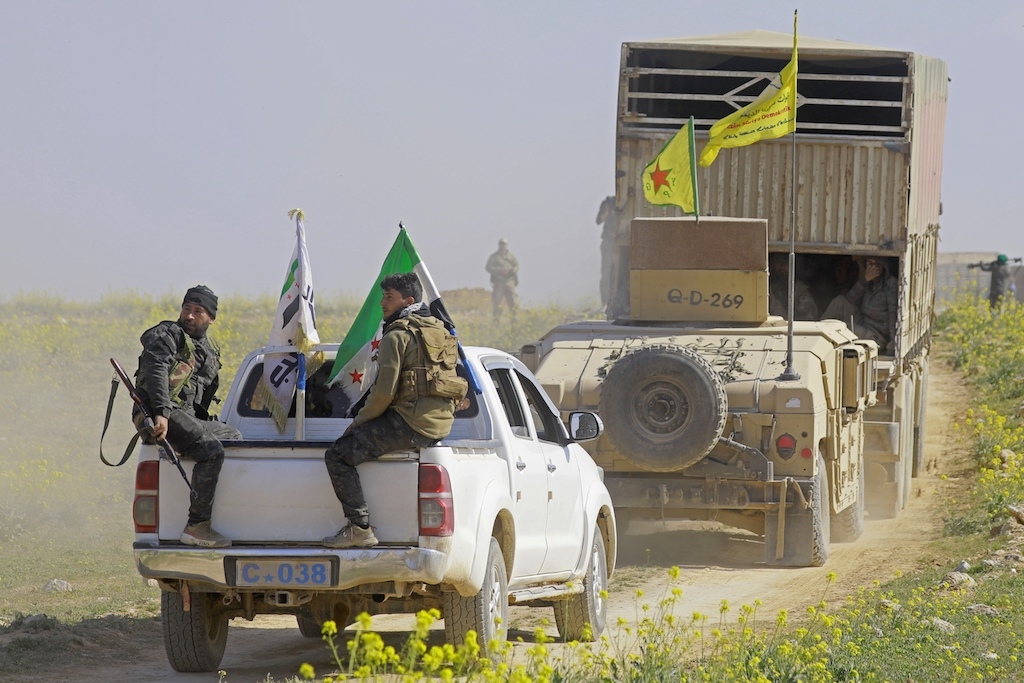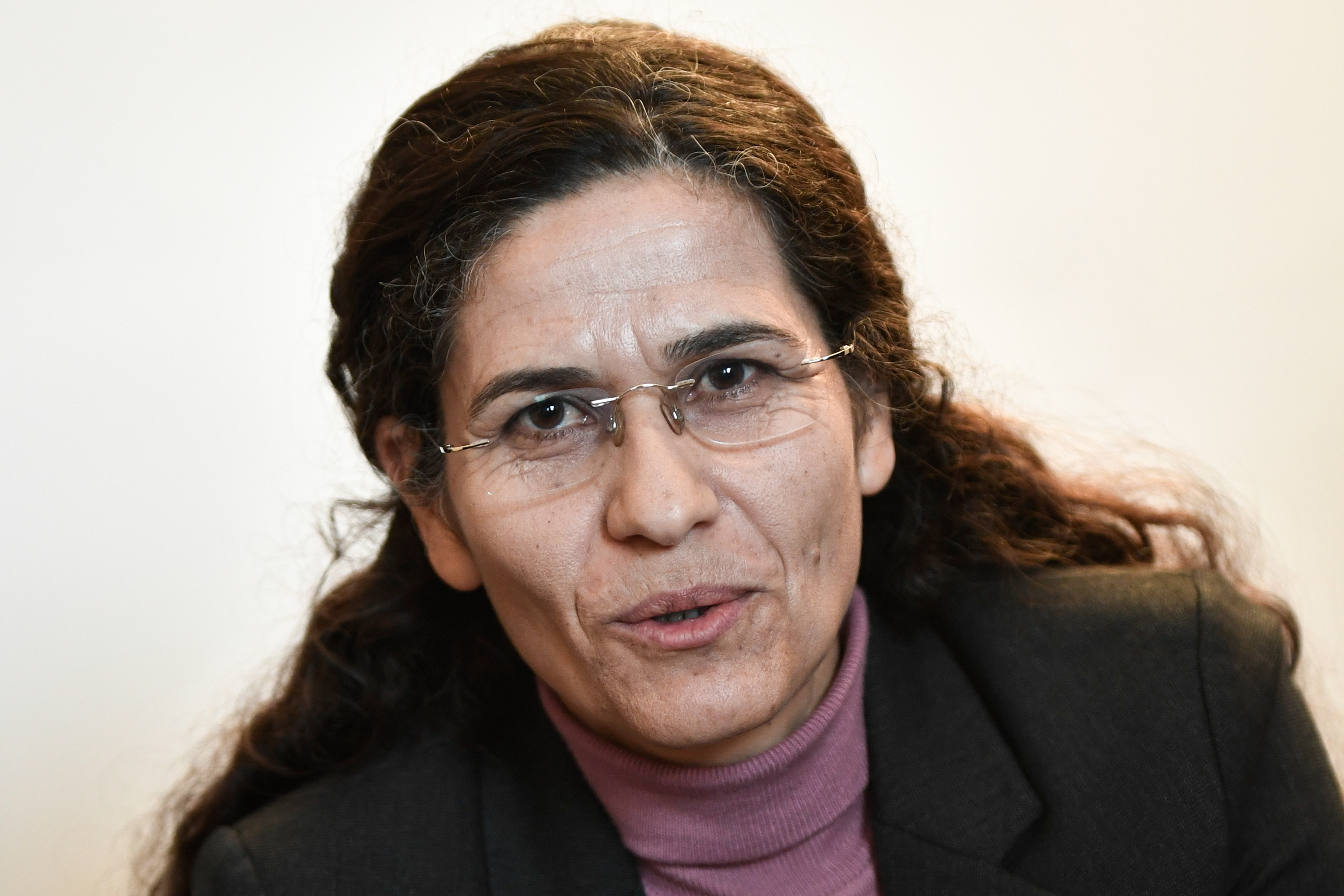Dozens of SDF fighters held by Islamic State in last Syrian stronghold

About 25 Syrian Democratic Forces (SDF) fighters are being held alongside civilians as human shields by Islamic State (IS) militants, the co-leader of the group’s political wing told Middle East Eye on Thursday.
Ilham Ahmed, co-chair of the Syrian Democratic Council (SDC), said that the US-backed SDF had halted its assault on the village of Baghouz because of the dangers to unarmed civilians and captives still inside the last pocket of IS-held territory.
“It has become necessary to pause the campaign to protect people,” she told MEE during a visit to London.
Ahmed is in the UK for talks with the British government aimed at trying to delay the withdrawal of US-led coalition forces from northeastern Syria.
On Friday, reporters said they saw dozens of trucks carrying civilians leaving Baghouz as the evacuation continued apace. SDF officials said they aimed to evacuate the remaining civilians on Friday.
Stay informed with MEE's newsletters
Sign up to get the latest alerts, insights and analysis, starting with Turkey Unpacked
'We want to hand these people over to their governments but if not their courts should come to us'
- Ilham Ahmed, SDC
Ahmed also called on European governments to take back their citizens who joined IS, many of whom are now being held in detention camps run by the SDF.
They include about 800 fighters and about 4,000 family members being held in separate camps.
“The problem needs to be addressed. We’ve been speaking to various states about accepting them, but there’s been no positive result so far,” she said.
There was talk of setting up local courts to put suspected former IS fighters and supporters on trial but the SDC did not have the personnel or the money to handle the issue, Ahmed said.
Another option was for foreign governments to send lawyers and prosecutors to territory under SDF control, she added.
“We don’t have courts to do it. We want to hand these people over to their governments but if not their courts should come to us”, she said.
She described the case of Shamima Begum, the teenager from East London who has had her British citizenship withdrawn by the UK government, as an internal British matter but said: “Withdrawing citizenship doesn’t solve the problem. We must find another way.”
Shock pull-out
Ahmed has just spent two weeks in Washington trying to modify US President Donald Trump’s shock decision to pull out the 2,000 American troops who have been helping the Kurdish-led SDF to defeat IS.
An intense debate is under way between the Pentagon, the State Department, Congress and the White House about the conditions and staging of the pull-out.
On Friday, it was announced that a contingent of 200 US soldiers would be remaining in Syria "for a period of time" following criticism of the pull-out.
Ahmed said she was resigned to the fact that the withdrawal would go ahead, although US officials had assured her there was no timeline.
Kurdish officials are concerned by Turkey’s threat to replace US forces and move into the autonomous regions set up by Syrian Kurds just south of the Turkish border when government troops pulled out at the height of the civil war.
Turkey considers the Kurdish People’s Protection Units (YPG), which form part of the SDF and have played a leading role in the ground campaign against IS, to be an extension of the Kurdistan Workers’ Party (PKK).
Ankara has already sent troops into the largely Kurdish province of Afrin and Turkish President Recep Tayyip Erdogan has vowed to also send Turkish forces east of the Euphrates into the Kurdish-controlled territory known as the Northern Federation of Syria, and also referred to by Kurds as Rojava.
Various ideas have been floated to forestall Turkey’s plans.
The Kurds have offered to pull their forces back 5km from the border if there is agreement for other forces, possibly including UN observers or peacekeepers, to patrol the buffer zone in between.
Russia has called for the Kurds to withdraw substantially further to assuage Turkish concerns about the security of the border.
The US has yet to develop a policy that satisfies Turkey, a fellow NATO member, without betraying its Kurdish allies in the SDF.
Ahmed accused Turkish-backed forces - who include allied groups of Syrian opposition fighters - in Afrin of “ethnic cleansing” and of wanting to do the same in Rojava.
“In Afrin there used to be freedom of religion and women’s freedom but Turkey wants to turn it into an Islamic area," she said.
“They are carrying out demographic change. Some 500,000 people have been expelled, and the 30,000 Kurds who remain are being Turkicised. They’re forcing Kurds to learn Turkish and only permit Turkish to be taught in schools,” she said.
Amnesty International reported in August that 140,000 people fled from Afrin after the Turkish invasion and are living in displaced people’s camps. In June, Human Rights Watch reported widespread looting and destruction of houses by Turkish-backed fighters in Afrin.
Turkey has fiercely denied claims of forced expulsion and has accused the YPG itself of engaging in ethnic cleansing and suppression of opposition.
"It is PKK/YPG that performs ethnic cleansing in Syria, changes the demographic structure, persecutes people and does not recognise anyone's right to live other than itself," said a senior Turkish official, speaking on condition of anonymity to MEE due to government protocol.
"Those who wish to see how our Kurdish, Arab and Turkmen brothers live in peace and tranquillity after the [Afrin operation], can look at Afrin. Around 300,000 Syrians, who were the original settlers of the region, returned to their homes where Turkey has cleared the area from terrorism."
Government control
Ahmed said Syrian President Bashar al-Assad’s government wanted to re-establish control over all of Syria.
Russian officials have occasionally said they favour Syria becoming a decentralised federation under a new constitution but she hinted that she feels Moscow has changed tack and now supports Assad's desire to restore full control with no concessions or compromise.
Our Arab allies are not happy with what the Turks are doing. They’ve not forgotten the Ottoman empire
- Ilham Ahmed, SDC
“We don’t accept the return of the regime as it was. We want to establish stability for the region. Thirty percent of Syrian territory is under SDF control and this includes 70 percent of the economy.”
The SDF area contains oil fields and much of Syria’s most productive arable land.
For the SDF to co-operate with Damascus, “the Syrian regime must accept discussions about amending the constitution. We want a decentralised government and a proper balance between the centre and the regions, recognition of different nationalities, and the right to be educated in your mother tongue”, she said.
She rejected claims that Kurdish leadership is resented by local Syrian Arabs who have worked and fought with the US-backed SDF.
She also expressed confidence that Arabs would not defect from the SDF but help the Kurds to defend their territory if Turkey attacked.
“Our Arab allies are not happy with what the Turks are doing. They’ve not forgotten the Ottoman empire,” she said.
She accused the Syrian government of trying to create tensions between Kurds and Arabs.
“The regime is giving the impression of tensions. The media also hasn’t given an accurate picture. In Deir Ezzor [a largely Arab city liberated by the SDF in 2017] there are no Kurds in the administration. It’s all done by Arabs. In Raqqa [the former IS capital] 20 percent of the population is Kurdish and so is 20 percent of the administration,” she said.
Middle East Eye delivers independent and unrivalled coverage and analysis of the Middle East, North Africa and beyond. To learn more about republishing this content and the associated fees, please fill out this form. More about MEE can be found here.





